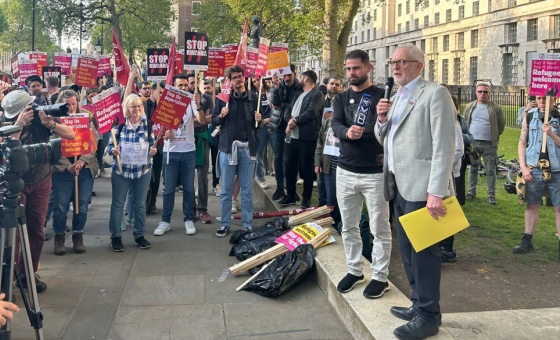This is the last article you can read this month
You can read more article this month
You can read more articles this month
Sorry your limit is up for this month
Reset on:
Please help support the Morning Star by subscribing here
REPORTS that the government is yet again looking at deregulating Sunday trading were met with dismay and disbelief by our members who are on the front line of delivering essential services during the Covid-19 emergency.
The government claims it will help the country out of recession, but that is wrong, misguided and a slap in the face for key workers. Shops can already open for 150 hours week, adding a few more hours will not make difference, but could be very damaging to shopworkers’ lives, our communities and the retail sector.
Usdaw members have worked throughout this crisis keeping the supermarket shelves stocked. This move to deregulate Sunday trading hours seems an opportunistic use of the coronavirus crisis. I would hope that the government would instead spend its time exploring how we can ensure that these low-paid key workers can get the level of pay and job security they deserve.
Longer Sunday working has a big impact on shopworkers, which is why over 90 per cent of our members remain opposed. Usdaw’s survey of shopworkers showed more than 80 per cent already have to work on Sundays, over two-thirds are under pressure to work on Sundays when they don’t want to. Only 4 per cent of shopworkers wanted to work more hours on Sundays, while nearly half want to work fewer.
The right to opt out of Sunday working is ineffective when employers do not have to offer alternative hours of work on another day. Around half of retail staff have caring responsibilities and most of them say they struggle to organise care when they have to work on Sundays.
Longer Sunday trading could lower wages, further squeezing premium pay — when Sunday trading was introduced in 1994, many employers responded by ending double-time pay for Sunday working.
Shopworkers will end up working longer hours for the same money. If employers were forced to recruit to cover longer Sunday trading that would impact pay because struggling retailers on tight margins will resist increasing their wage bill.
While we appreciate the desire to help the retail sector, this attempt to undo a long-held and workable compromise on Sunday trading is misguided. Longer Sunday trading would be bad for business. Opening stores for longer does not put more money in customers’ pockets, it simply spreads the same spend over a longer period therefore increasing overheads and reducing profits.
Sunday trading would not result in any increase in retail sales or in employment and would have a detrimental effect on small stores.
Sunday is the most profitable day of the week, only because of the restricted hours. It is fundamentally flawed to assume that hourly profits on Sundays would continue over a longer period of opening.
What the retail sector needs is an industrial strategy led by government, something we and the British Retail Consortium have consistently called for. The government needs to level the playing field on taxation between online and the high street, as well as enable councils to breathe new life into town centres and make them community hubs.
Retailers have mixed views over the benefits of opening longer on Sundays. Small stores are exempt from restrictions and the Association of Convenience Stores says that they rely on the income from those few extra hours on Sundays.
Kevin Hawkins, a former British Retail Consortium director-general, investigated longer Sunday trading under the government’s Red Tape Challenge and said about supermarkets and restricted Sunday opening: “They have all lived with it very well. What we have got is a workable compromise. Most people seem to be satisfied with it most of the time.”
Many deregulators point to the temporary suspension of Sunday trading laws for the 2012 Olympic Games, but the truth is longer opening was a flop. Our survey showed that 95 per cent of stores had no increase in customers and two-thirds were quieter or much quieter than normal.
Many stores ended their additional opening hours early because they were losing money, in fact there had been an overall marginal fall in retail sales of 0.2 per cent according to the Office for National Statistics. Any increase in takings had more to do with the largest international sporting event taking place in England, than supermarkets opening a few hours extra.
Just 26 per cent of stores used only volunteers to increase staff numbers, over half of staff were pressured to work extra hours. Oxford Economics predicted that the shift in sales from small to large retailers experienced during the Olympics would result in nearly 4,000 net job losses if the temporary extension continued.
Usdaw members do not want to see longer Sunday trading hours, especially when shopworkers are under huge pressures because of the crisis. Shopworkers need a break on Sundays, not longer opening hours. We urge the government to reject extending trading hours and to focus on supporting the retail sector.












